12 Best Text to Speech Tools for Creators in 2025
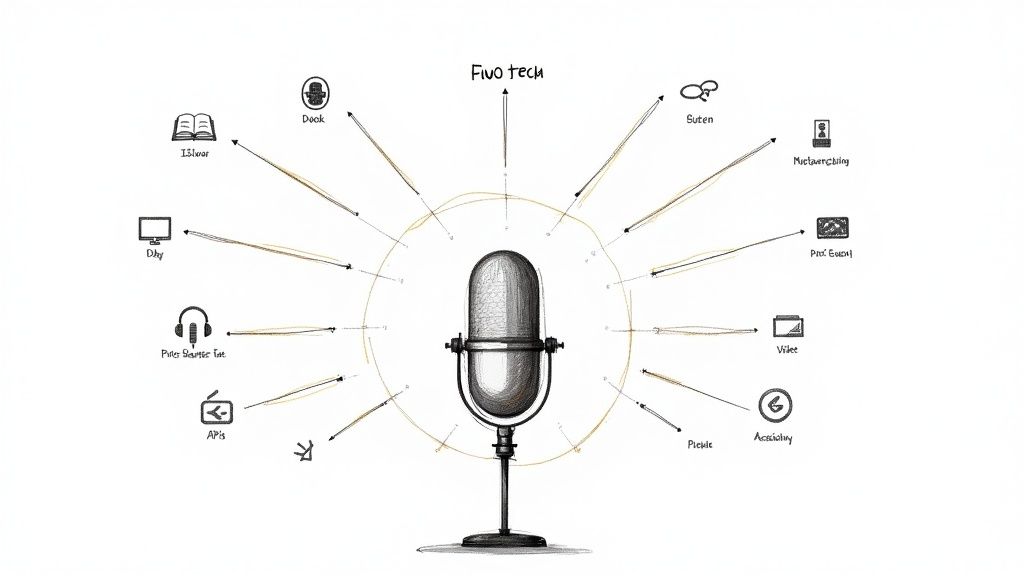
In a content-saturated world, the quality of your audio can make or break audience engagement. Whether you're a podcaster, YouTuber, e-learning developer, or marketer, finding the right AI voice is crucial for delivering your message with impact. But with a crowded market, how do you choose the best text to speech (TTS) tool for your specific needs? This guide cuts through the noise.
We provide actionable insights into the top 12 TTS platforms, comparing them directly on voice realism, language support, customization, and pricing. Our focus is on practical application, helping you understand not just what each tool does, but how you can leverage its unique strengths. Each review includes screenshots and direct links to help you make a fast, informed decision.
We will explore everything from developer-focused APIs to all-in-one creative suites. We’ll also highlight groundbreaking features like unlimited text to speech and instant voice cloning, particularly from platforms like Verbatik, which empower creators to scale production without limits. This resource is designed to help you find the perfect synthetic voice to match your project's tone, budget, and technical requirements, saving you hours of research.
1. Verbatik Technologies Limited
Verbatik Technologies Limited emerges as a definitive leader in the AI voice generation space, establishing itself as the best text-to-speech platform for users who require a comprehensive, all-in-one content creation suite. It moves beyond simple text-to-speech, integrating an array of powerful AI tools into a single, intuitive dashboard. This unified approach provides an actionable path for creators, developers, and businesses to produce studio-grade audio and video content with remarkable efficiency.
What truly sets Verbatik apart is its combination of a vast voice library and its advanced, near-perfect voice cloning technology. Users gain access to over 600 hyper-realistic voices across 142 languages, making it an ideal choice for projects with a global audience. The platform’s proprietary cloning technology captures the emotional nuance and accent of a source voice in seconds, providing a powerful tool for creating personalized, authentic audio at scale. This ethical, consent-based system ensures user identity is protected while delivering unparalleled quality.
Key Features & Advantages
Verbatik’s ecosystem is designed for maximum creative output, offering a feature set that consolidates multiple production tools. Unlike competitors that specialize only in TTS, Verbatik provides a complete multimedia toolkit.
- Comprehensive AI Toolkit: The platform includes an AI avatar video creator, royalty-free music generation, custom sound effects, and an AI photo generator. This integration streamlines workflows, eliminating the need to switch between different applications for video, audio, and visual assets.
- Unlimited Voice Generation: A standout benefit is the provision of unlimited text-to-speech and voice cloning on select plans, empowering high-volume content creators to produce without constraints. This is a key actionable insight for creators looking for predictable costs and unrestricted output.
- Developer-Friendly API: For developers looking to embed lifelike voice capabilities into their applications, Verbatik offers a robust and highly affordable API priced at just $0.000025 per character.
- Integrated Sound Studio: An onboard Sound Studio allows for professional-level audio mixing and noise reduction, giving users fine-grained control over their final output directly within the platform.
Pricing and Accessibility
Verbatik’s pricing structure is designed to be accessible for a wide range of users, from solo creators to large enterprises. Flexible subscription plans start at just $15 per month when billed annually, offering generous character credits and full commercial rights. While some advanced features like multiple custom voice clones are reserved for higher-tier plans, the entry-level options provide significant value. For a deeper analysis of how it stacks up against other tools, you can learn more about its place among the best TTS tools of 2025.
Website: https://verbatik.com
2. Amazon Polly (AWS)
Amazon Polly stands out as a powerful, developer-focused text-to-speech service integrated directly into the Amazon Web Services (AWS) ecosystem. It's an ideal choice for businesses and developers needing a scalable and reliable TTS solution to build into their own applications. Polly offers a tiered voice system, including Standard, Neural, Long-form, and the latest Generative voices, allowing users to balance cost with the required level of voice realism for their specific project.
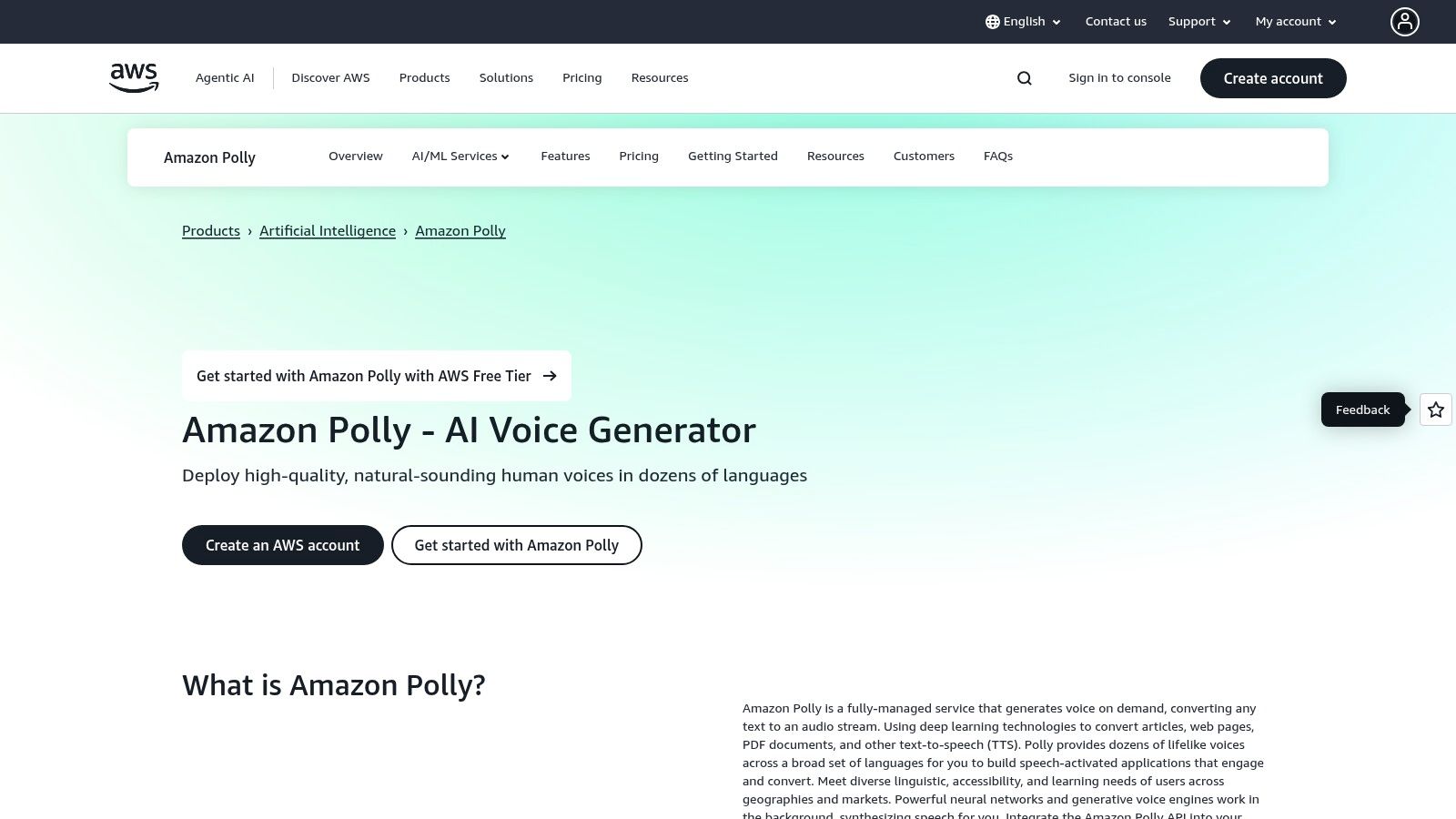
The platform supports over 100 voices across more than 40 languages, making it versatile for global applications like interactive voice response (IVR) systems, e-learning modules, and media narration. However, its pricing model can be complex. Costs are calculated per character, varying significantly between voice tiers. This pay-as-you-go structure is efficient for fluctuating demand but can become expensive for high-volume, consistent use cases. An actionable insight here is to compare this model against services like Verbatik, which offers unlimited text to speech and voice cloning, providing a more cost-effective alternative for heavy users.
Key Features & Considerations
- Pros: Backed by AWS's robust infrastructure, it guarantees high availability and scalability. The API-first approach makes it a top choice for integration.
- Cons: Requires an AWS account, which can be intimidating for non-technical users. The tiered, per-character pricing is complex to forecast.
- Best For: Developers and businesses needing API access for applications like IVR, accessibility tools, and dynamic content narration.
Setting up and managing billing through the AWS console presents a learning curve. For a deeper analysis of how Polly stacks up against other text to speech software, you can explore further comparisons.
Website: https://aws.amazon.com/polly/
3. Google Cloud Text-to-Speech
Google Cloud Text-to-Speech is another powerhouse in the developer-centric TTS space, offering a sophisticated suite of voices through its robust cloud platform. It’s a direct competitor to AWS Polly, providing enterprises and developers with the tools to integrate high-fidelity, natural-sounding speech into their applications. The service is known for its high-quality WaveNet and Neural2 voices, which use advanced deep learning models to generate human-like audio.
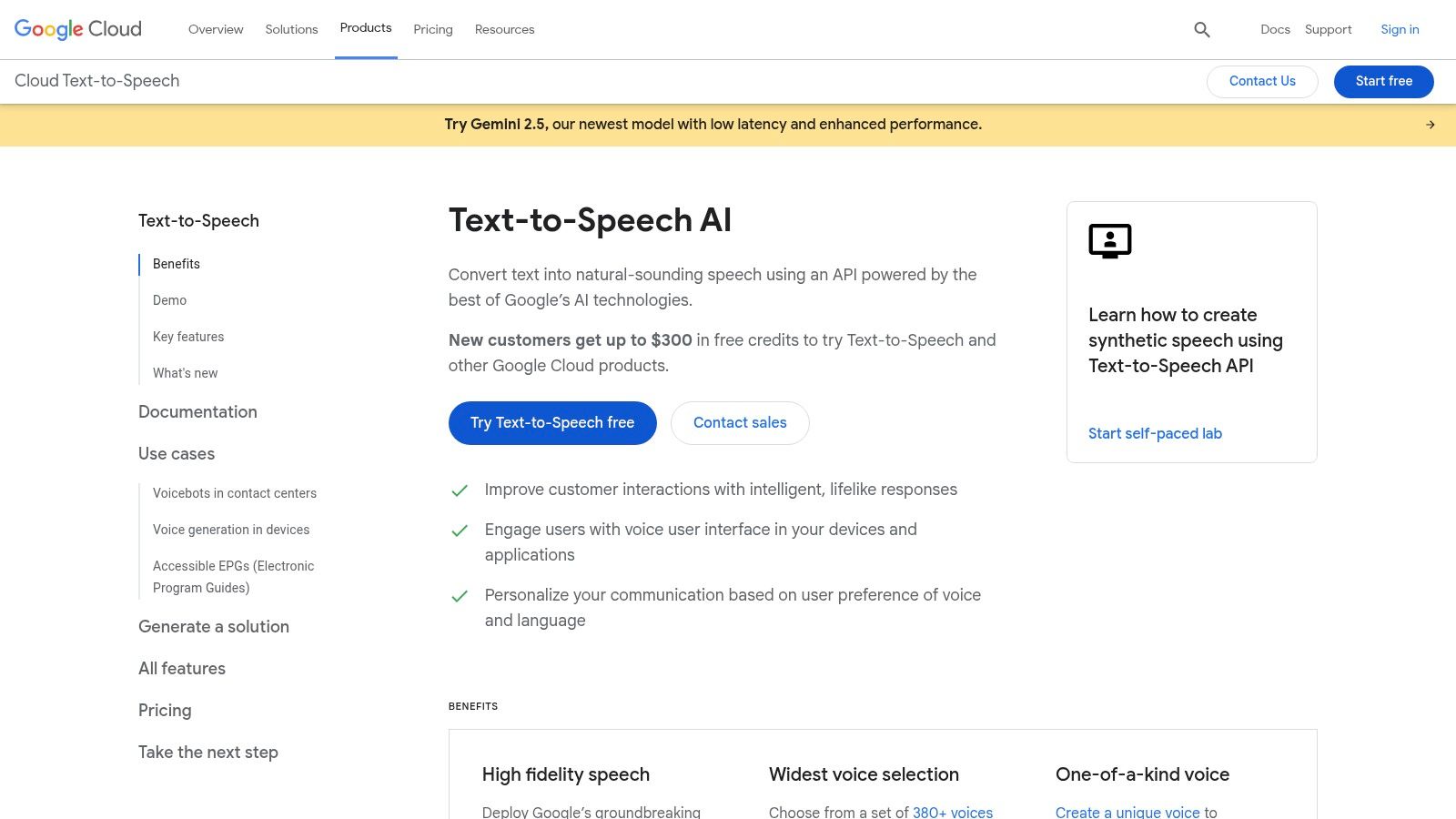
The platform supports a vast array of voices and languages, with multiple voice families (Standard, WaveNet, Neural2, Studio) that come with different capabilities and pricing. Its billing is based on the number of characters or bytes processed, which offers flexibility but can also be complex to manage for high-volume needs. For creators seeking predictable costs, an actionable insight is to consider alternatives like Verbatik's unlimited text to speech and voice cloning, which offer a more straightforward pricing model without character limits.
Key Features & Considerations
- Pros: Access to Google’s cutting-edge WaveNet and Neural2 voices, which are among the most realistic on the market. Offers a generous free tier for developers to get started.
- Cons: The tiered voice system and dual billing units (characters/bytes) can be confusing. Requires a Google Cloud account and technical setup.
- Best For: Developers building applications that require premium voice quality, such as customer service bots, e-learning platforms, and global content localization.
Integrating this service requires familiarity with the Google Cloud ecosystem, which presents a barrier for non-technical users. You can explore how this technology works in more detail to better understand its applications.
Website: https://cloud.google.com/text-to-speech/
4. Microsoft Azure AI Speech (Text-to-Speech)
Microsoft Azure AI Speech is a powerful, enterprise-grade text-to-speech service deeply integrated within the Microsoft Azure cloud platform. It is designed for businesses and developers who require high-quality, lifelike voice synthesis with advanced customization options. The service features cutting-edge Neural and Neural HD voices, along with innovative Custom Neural Voice and Personal Voice technologies, which allow for creating unique brand voices or cloning personal ones under strict ethical guidelines.
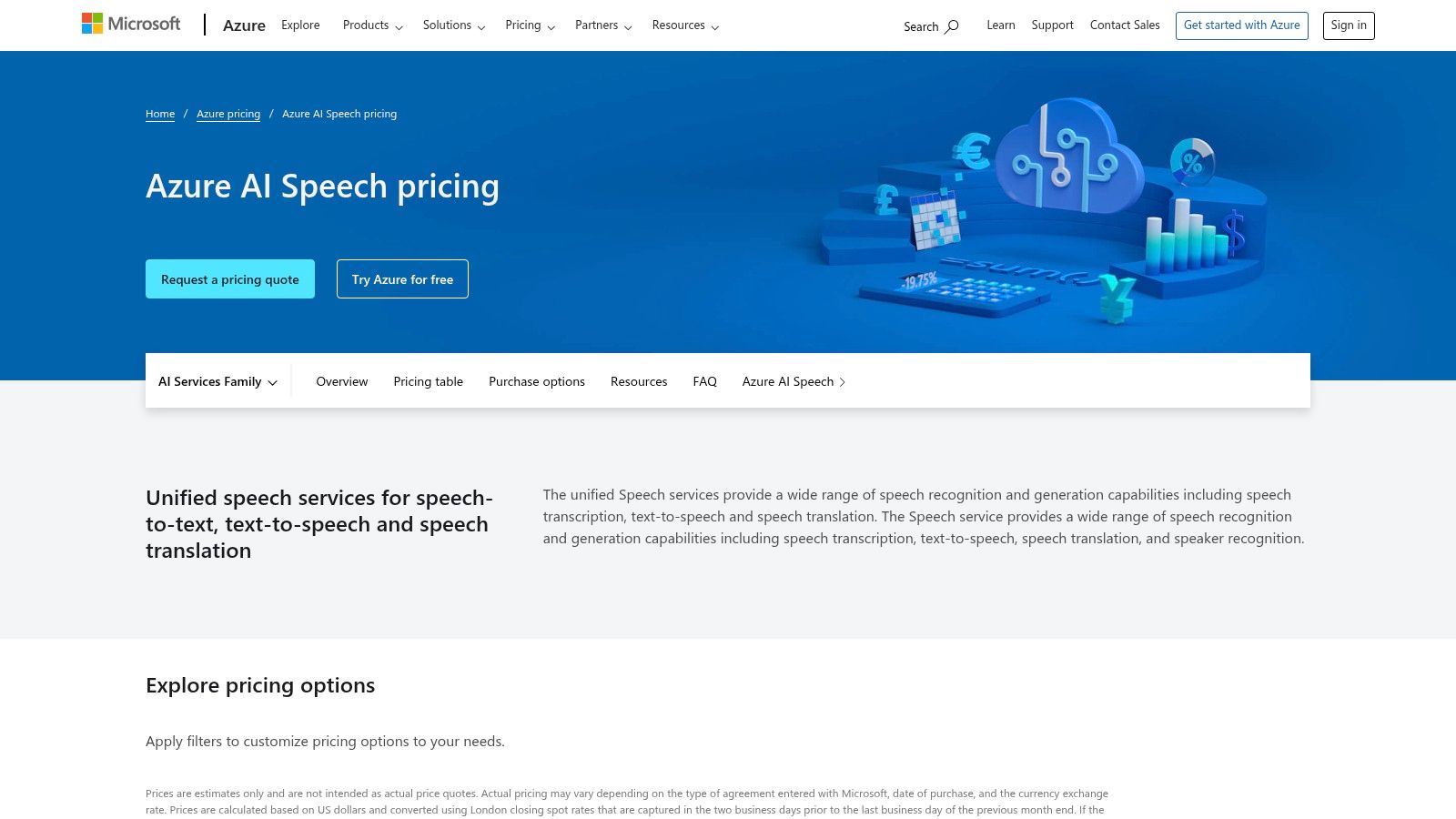
With its comprehensive API and flexible deployment options, including on-premises containers, Azure provides unparalleled control for enterprise applications. However, its pricing structure is based on a per-character model, which can become costly for large-scale projects. While there is a generous free tier of 0.5 million characters monthly for Neural voices, high-volume users might find services like Verbatik, which offers unlimited text to speech and voice cloning, to be a more predictable and cost-effective alternative for consistent content generation needs. This is a crucial, actionable insight for budget planning.
Key Features & Considerations
- Pros: Flexible deployment options, including cloud and on-premises containers, suit diverse security needs. Backed by strong enterprise compliance and Microsoft's robust ecosystem.
- Cons: The pricing structure is complex and varies by region, requiring careful review with the pricing calculator to forecast expenses.
- Best For: Enterprise-level applications, developers needing robust API integration, and companies looking to create a custom brand voice for accessibility or customer service bots.
The platform's focus on responsible AI makes it a leader in ethical voice synthesis, a key factor for public-facing applications. You can learn more about how text-to-speech improves accessibility.
Website: https://azure.microsoft.com/pricing/details/cognitive-services/speech-services/
5. IBM Watson Text to Speech
IBM Watson Text to Speech is an enterprise-grade service designed for businesses requiring high levels of security, control, and customization. Its key differentiator is the flexible deployment model, allowing it to run on the IBM Cloud or on-premise through IBM Cloud Pak for Data. This makes it a strong contender in regulated industries like finance and healthcare where data privacy and compliance are paramount. The service provides access to a growing library of neural voices and powerful customization capabilities.
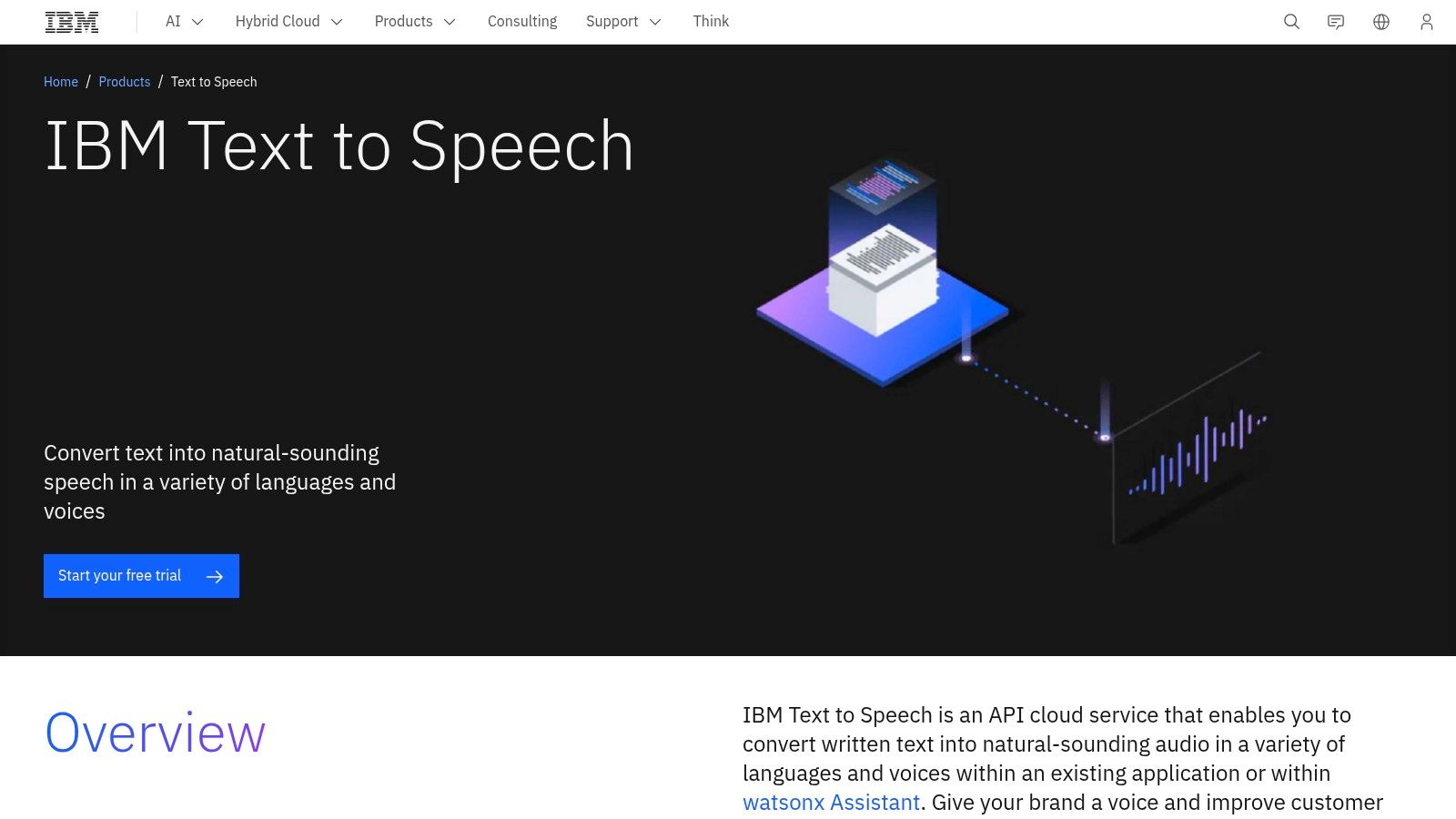
With over 35 neural voices across more than 16 languages, Watson is built for creating brand-specific audio experiences, including custom-branded voices. However, its pricing structure is less transparent than competitors, often requiring direct sales contact. This enterprise focus means it's not a simple self-serve platform. For projects demanding high volume without complex contracts, a key actionable insight is to explore alternatives like Verbatik that offer more straightforward access to unlimited text to speech and advanced features like voice cloning, which can be a more practical solution for content creators and marketers.
Key Features & Considerations
- Pros: Strong enterprise focus on privacy and security. Flexible deployment options (cloud or on-premise) are ideal for regulated industries.
- Cons: Pricing is not transparent and often requires contacting sales, creating a barrier for smaller users. Fewer self-serve options compared to other platforms.
- Best For: Large enterprises, especially in finance and healthcare, needing a secure, compliant, and customizable TTS solution with premium support SLAs.
Integrating Watson is best accomplished through its robust APIs and SDKs, but the initial setup and negotiation process can be more involved than with typical cloud providers.
Website: https://www.ibm.com/products/text-to-speech
6. ElevenLabs
ElevenLabs has rapidly gained a reputation as a leader in expressive, natural-sounding AI voices, making it a top choice for creators, developers, and businesses. The platform is celebrated for its ability to produce highly emotive audio, moving beyond robotic narration to capture subtle nuances in speech. It offers a comprehensive suite of tools, including high-fidelity TTS, professional voice cloning, and multilingual dubbing, all accessible through a clean web studio and a robust API.
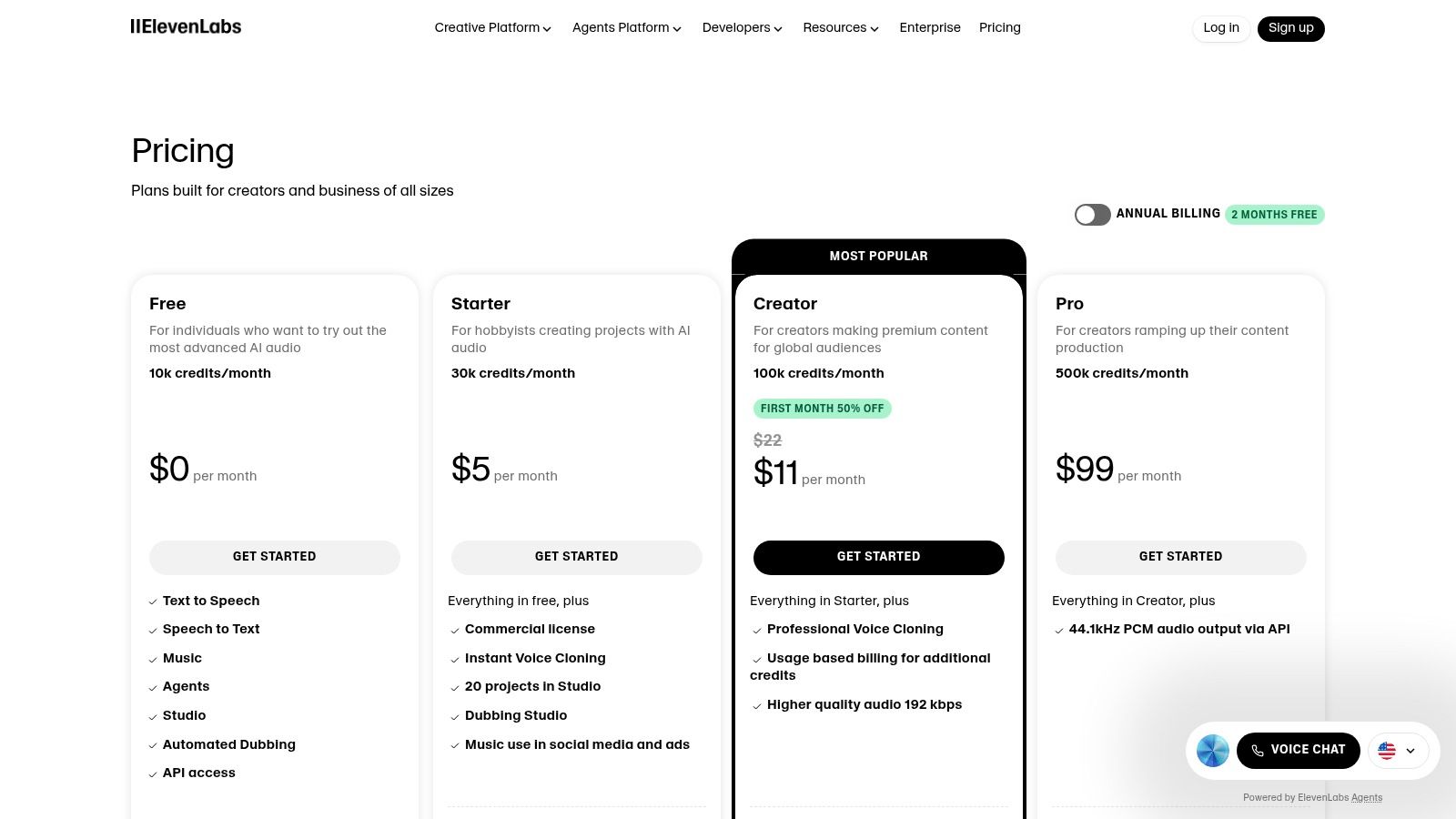
The platform operates on a credit-based system across multiple tiers, from a free plan to scalable enterprise options. While this provides flexibility, the conversion from characters to credits can be complex to manage for consistent, high-volume projects. For users needing predictable costs without tracking usage, a key actionable insight is to consider a service like Verbatik, which offers unlimited text to speech and voice cloning, presenting a more straightforward alternative. Understanding the relationship between text and speech technology is key to choosing the right platform; you can read about the future of voice technology to learn more.
Key Features & Considerations
- Pros: Delivers some of the most realistic and expressive AI voices on the market. The web interface is user-friendly for creators of all skill levels.
- Cons: The credit-based subscription model requires careful usage monitoring and can become costly for high-volume narration needs.
- Best For: Content creators, podcasters, and developers who prioritize emotional depth and realism in voice outputs for projects like audiobooks, video narration, and gaming.
Website: https://verbatik.com/
7. PlayHT
PlayHT positions itself as a premium AI voice generator, particularly excelling in high-fidelity voice cloning and providing a real-time text-to-speech API for developers. It is a strong contender for creators and businesses focused on producing studio-grade audio content, from podcasts to professional voiceovers for video. The platform offers a variety of subscription tiers, including a free plan to test the service, with all paid plans granting commercial usage rights.
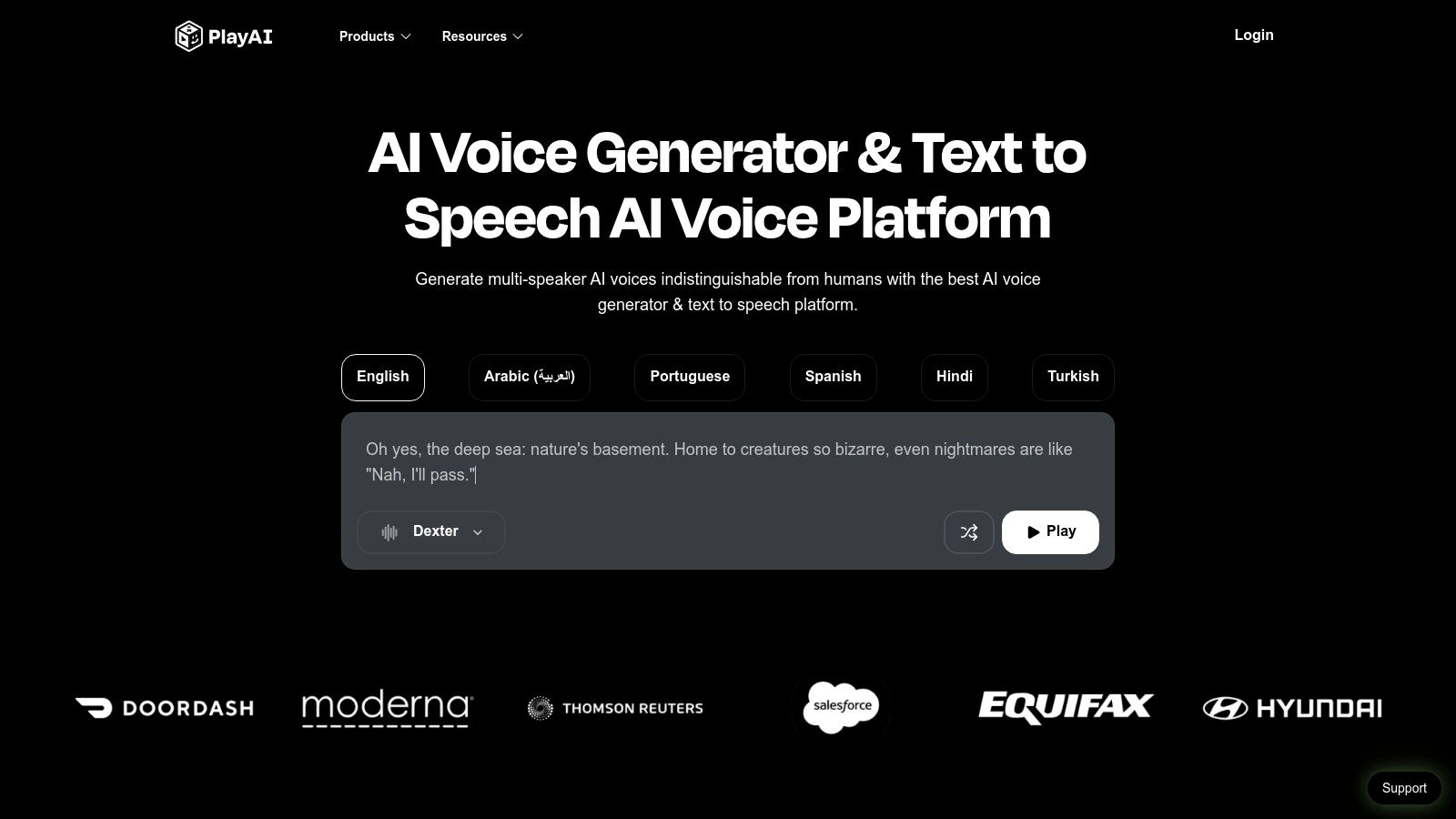
The platform’s strength lies in its advanced cloning technology and robust API, making it a favorite for integrations and custom voice projects. However, while PlayHT offers plans branded as ‘Unlimited,’ users should carefully review the fine print, as these are often subject to fair-use policies that impose practical caps on generation. An actionable insight here is to contrast this with services like Verbatik, which offers genuinely unlimited text to speech and voice cloning, providing more predictable costs for high-volume users who need consistent, heavy output without worrying about hidden limits.
Key Features & Considerations
- Pros: Offers some of the best text to speech quality for voice cloning and API integrations. The pricing can be competitive for certain usage levels.
- Cons: ‘Unlimited’ plans have fair-use policies that can be restrictive. The various tiers can be confusing for new users to navigate.
- Best For: Content creators, developers, and businesses needing high-quality custom voice clones for podcasts, audiobooks, and API-driven applications.
PlayHT's focus on quality makes it a top-tier choice, but understanding its usage policies is crucial for managing project costs effectively.
Website: https://play.ht/pricing/
8. WellSaid Labs
WellSaid Labs positions itself as a premium synthetic voice studio, targeting enterprise and professional production environments. It provides exceptionally high-quality, broadcast-grade voice avatars designed for corporate training, marketing, and advertising content where brand consistency is critical. The platform is built for team collaboration, offering features that streamline workflows for professional content creators.
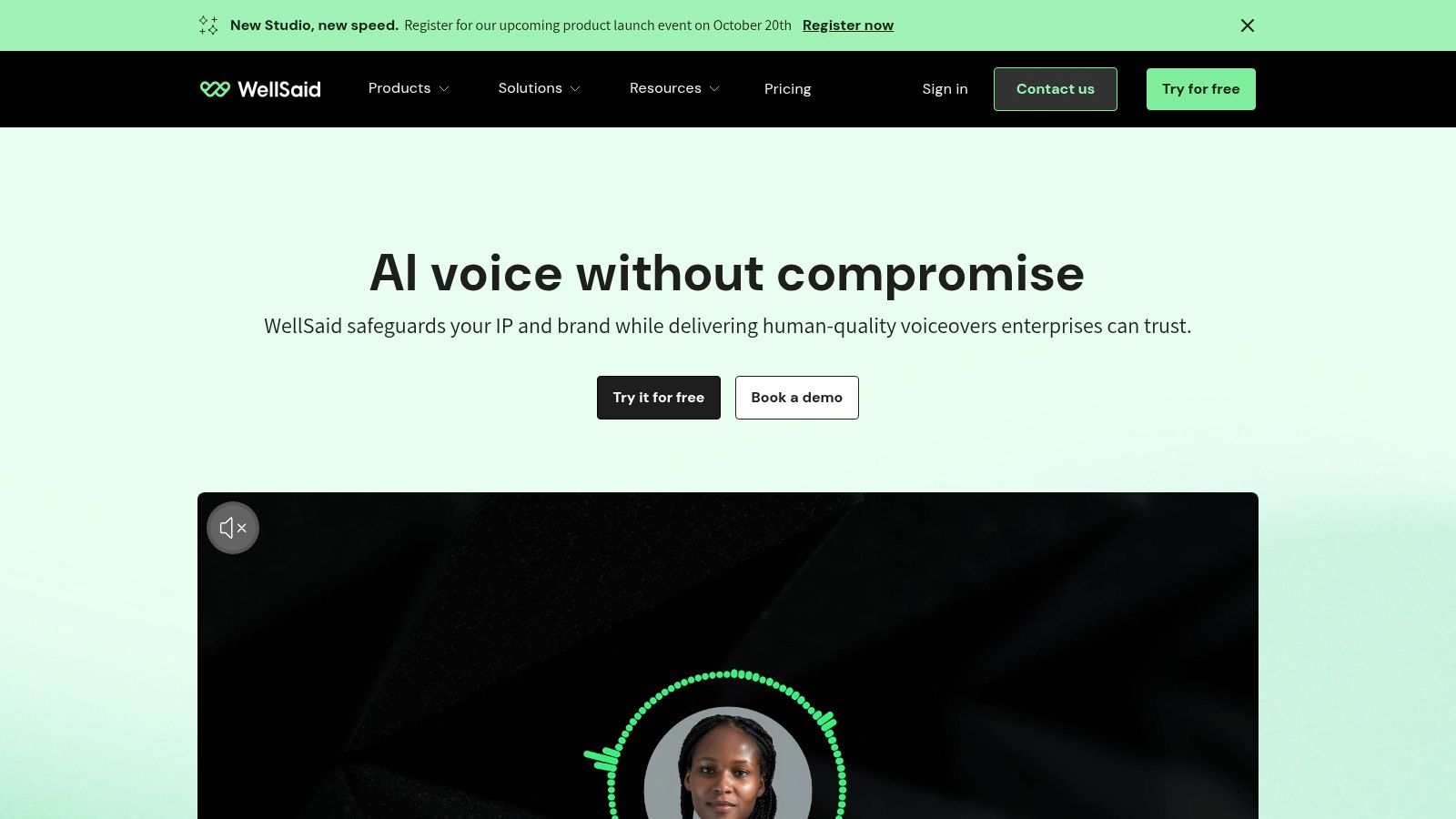
Unlike many creator-focused tools, WellSaid Labs emphasizes clear commercial licensing and consistent voice quality across all projects. Its pricing structure is geared towards business use, which can be a significant investment for individuals or small teams. For users needing high-volume generation without per-project costs, an actionable insight is to evaluate alternatives like Verbatik, which offers unlimited text to speech and voice cloning, presenting a more scalable and budget-friendly solution. WellSaid Labs' strength lies in its predictable, professional-grade output for corporate needs.
Key Features & Considerations
- Pros: Delivers consistent, broadcast-grade voice quality suitable for professional productions. Provides clear commercial usage rights and team collaboration features.
- Cons: Higher price point makes it less accessible for hobbyists or small-scale creators. The focus is on a curated library rather than extensive voice customization.
- Best For: Enterprise clients, L&D (Learning and Development) teams, and advertising agencies requiring polished, reliable voiceovers for commercial projects.
The platform's API and custom voice creation services further cement its position as a go-to for businesses looking to integrate a unique and consistent brand voice into their products and communications.
Website: https://wellsaidlabs.com
9. Speechify
Speechify is a highly accessible, consumer-focused text-to-speech tool designed to read digital content aloud. It excels at converting web pages, PDFs, and documents into spoken words across multiple platforms, including iOS, Android, and browser extensions. The platform is particularly popular among students and professionals for its ease of use in consuming written material on the go, offering features like celebrity voices to enhance the listening experience.
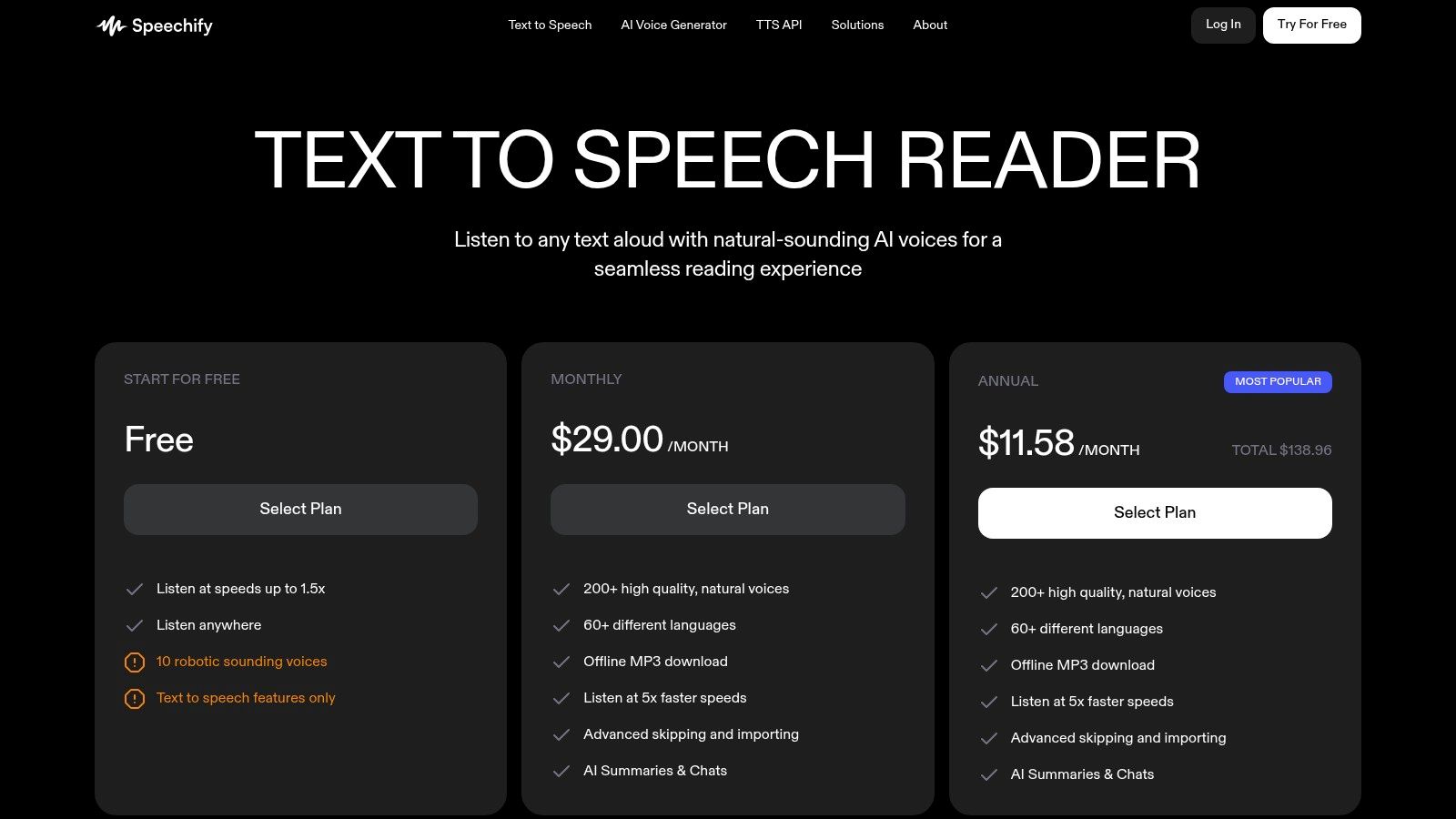
While its free tier provides a good entry point, the best features, including over 60 languages and premium voices, are locked behind a subscription. This subscription-based model allows for offline downloads but can become costly for users who need consistent, high-volume audio generation for commercial projects. In such cases, a valuable insight is that platforms like Verbatik, which offers unlimited text to speech and voice cloning, may present a more scalable and cost-effective alternative for content creators and businesses.
Key Features & Considerations
- Pros: Excellent cross-platform usability with strong mobile apps. User-friendly interface is ideal for personal productivity and learning.
- Cons: The premium subscription is required for most advanced voices and features. Frequent upselling can be a distraction for free users.
- Best For: Students, professionals, and individuals with reading disabilities who need a simple tool to listen to articles, books, and documents.
The primary focus is on personal consumption rather than commercial audio production, making it less suitable for developers or marketers needing API access or advanced voice customization.
Website: https://speechify.com/pricing/
10. NaturalReader
NaturalReader uniquely positions itself by offering two distinct products: a personal text-to-speech reader for accessibility and private use, and a separate "AI Voice Generator" for commercial audio production. This clear separation caters to different audiences, making it a strong choice for individuals who need an assistive reading tool without paying for commercial licenses. Its OCR functionality, which converts scanned documents and images into audible speech, is a standout feature for students and researchers.
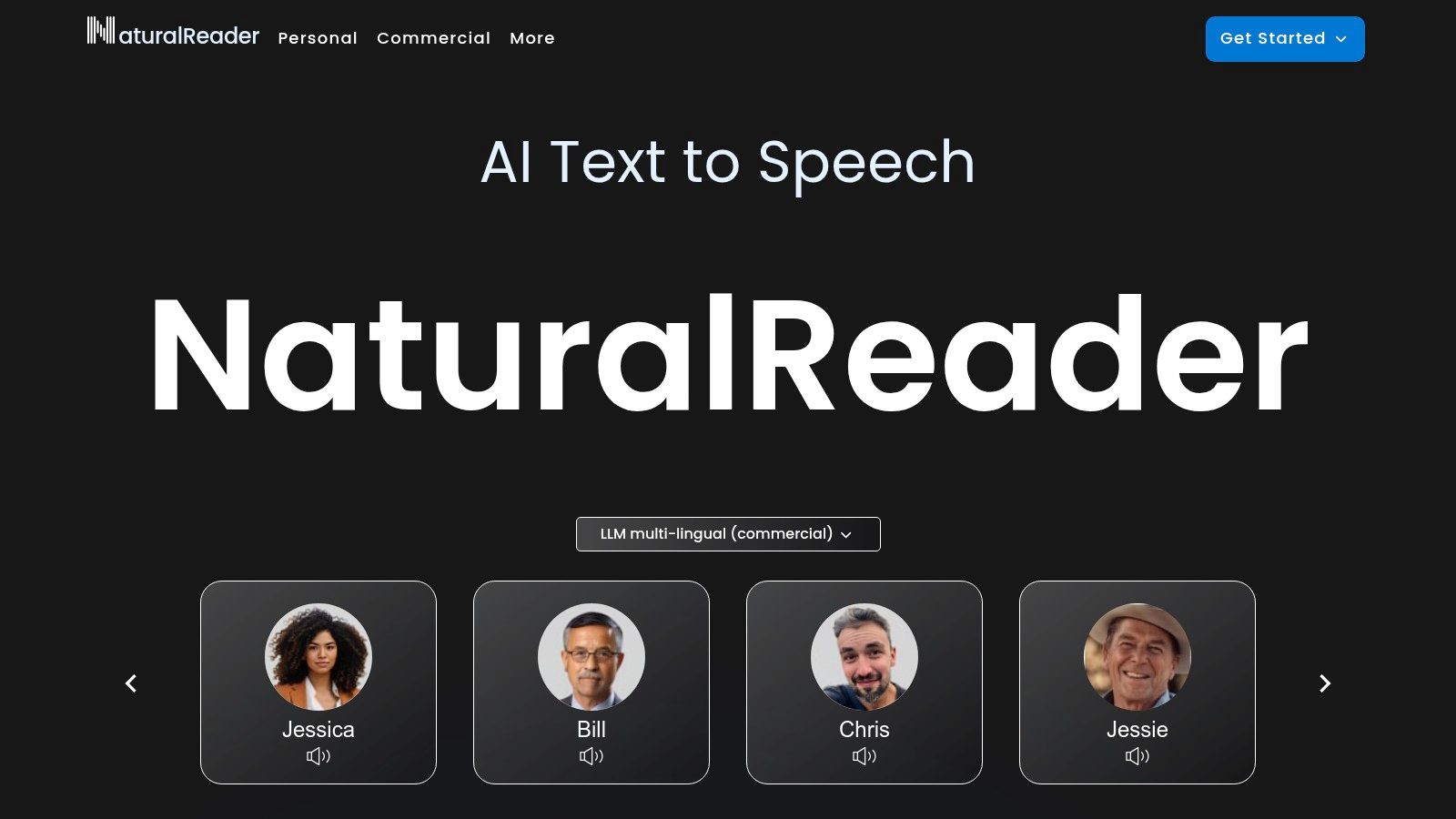
The commercial side offers over 250 AI voices in more than 40 languages, complete with a studio editor for fine-tuning audio. However, its pricing for commercial use is on the higher end and may not be ideal for creators needing consistent, high-volume output. A practical insight for those users is that platforms like Verbatik often present a more predictable cost structure with their unlimited text to speech and voice cloning features, which could be more economical for extensive projects.
Key Features & Considerations
- Pros: Strong distinction between personal and commercial plans. Excellent OCR feature for converting physical documents to audio.
- Cons: Commercial plan pricing can be expensive compared to competitors. The user interface can feel dated compared to more modern platforms.
- Best For: Students and individuals needing assistive technology for reading, and businesses that require occasional high-quality voiceovers for commercial projects.
While the personal reader offers great value, businesses should carefully evaluate the commercial plan’s cost against their production volume and needs.
Website: https://www.naturalreaders.com/
11. ReadSpeaker
ReadSpeaker is an enterprise-grade text-to-speech provider that excels in accessibility and educational applications. Its extensive suite of tools, including webReader for websites and speechMaker for audio production, is engineered to help organizations meet accessibility compliance standards and enhance learning experiences. With over 200 voices in more than 50 languages, it offers a mature and reliable solution for large-scale deployments.
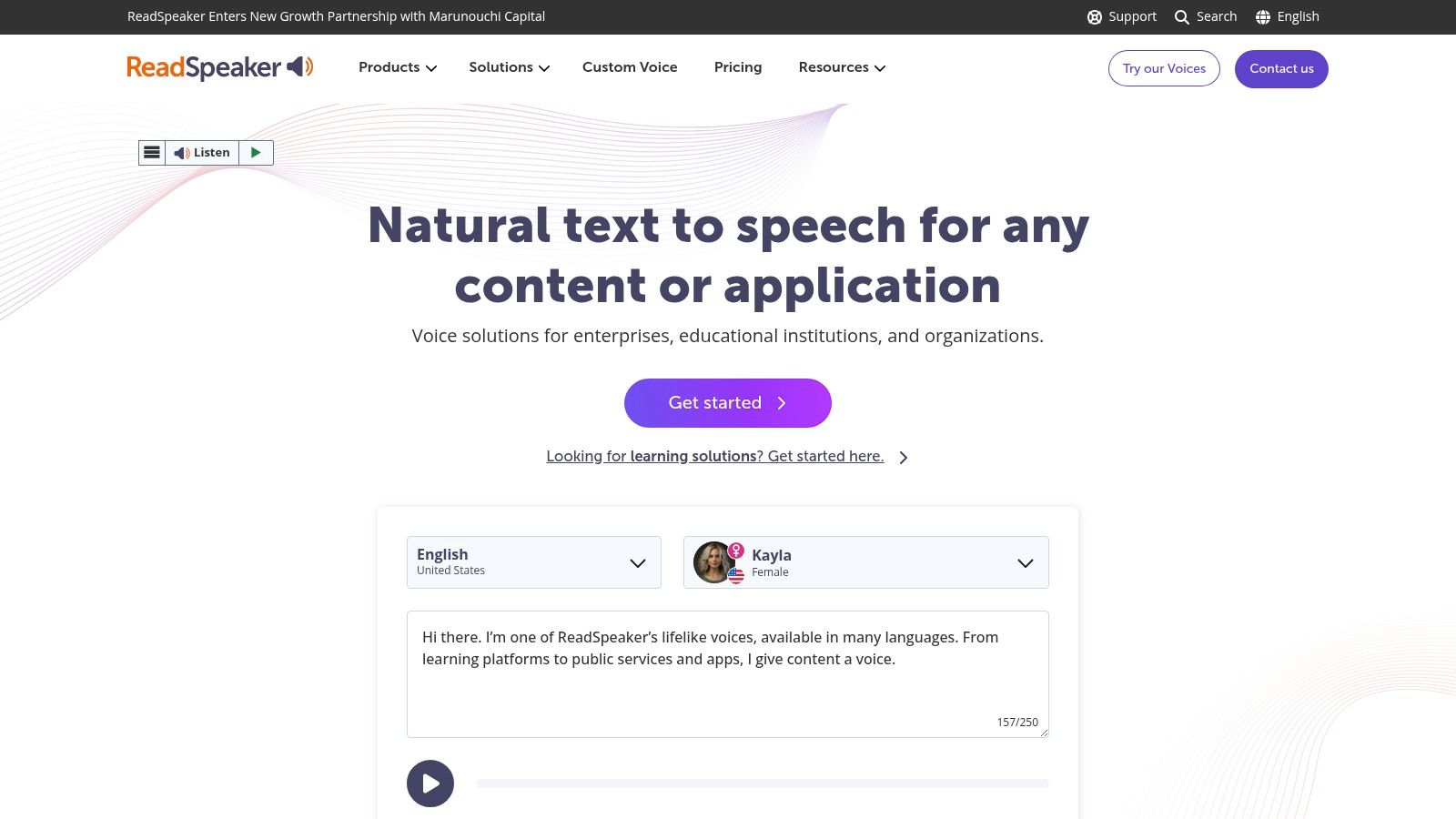
The platform’s strength lies in its flexible licensing models, catering to enterprise needs with subscription, license, and pay-per-use options. However, this focus means that pricing often requires a custom quote, making it less accessible for individual creators or small businesses. An actionable insight for users seeking predictable, high-volume audio creation without complex contracts is to explore platforms like Verbatik, which offer a more straightforward alternative with their unlimited text to speech and voice cloning features.
Key Features & Considerations
- Pros: A leader in accessibility and educational TTS, offering robust tools for compliance. Provides diverse and flexible deployment options for organizations.
- Cons: Pricing is not transparent and requires direct sales contact for most services. The platform is less suited for casual, small-scale, or individual use.
- Best For: Educational institutions, government agencies, and corporations needing to make their digital content accessible and engaging for all users.
ReadSpeaker's enterprise focus makes it a powerhouse for specific markets, but individuals may find the onboarding process and pricing structure prohibitive compared to more direct, self-service solutions.
Website: https://www.readspeaker.com/
12. Descript (Overdub and AI Speech)
Descript carves out a unique niche by embedding text-to-speech directly into a comprehensive audio and video editing suite. Rather than being a standalone TTS tool, its AI voices and Overdub (voice cloning) feature are integrated into a creative workflow, allowing creators to edit audio by simply editing text. This makes it an incredibly efficient solution for podcasters, video producers, and marketing teams who need to make quick corrections or generate narration without re-recording.
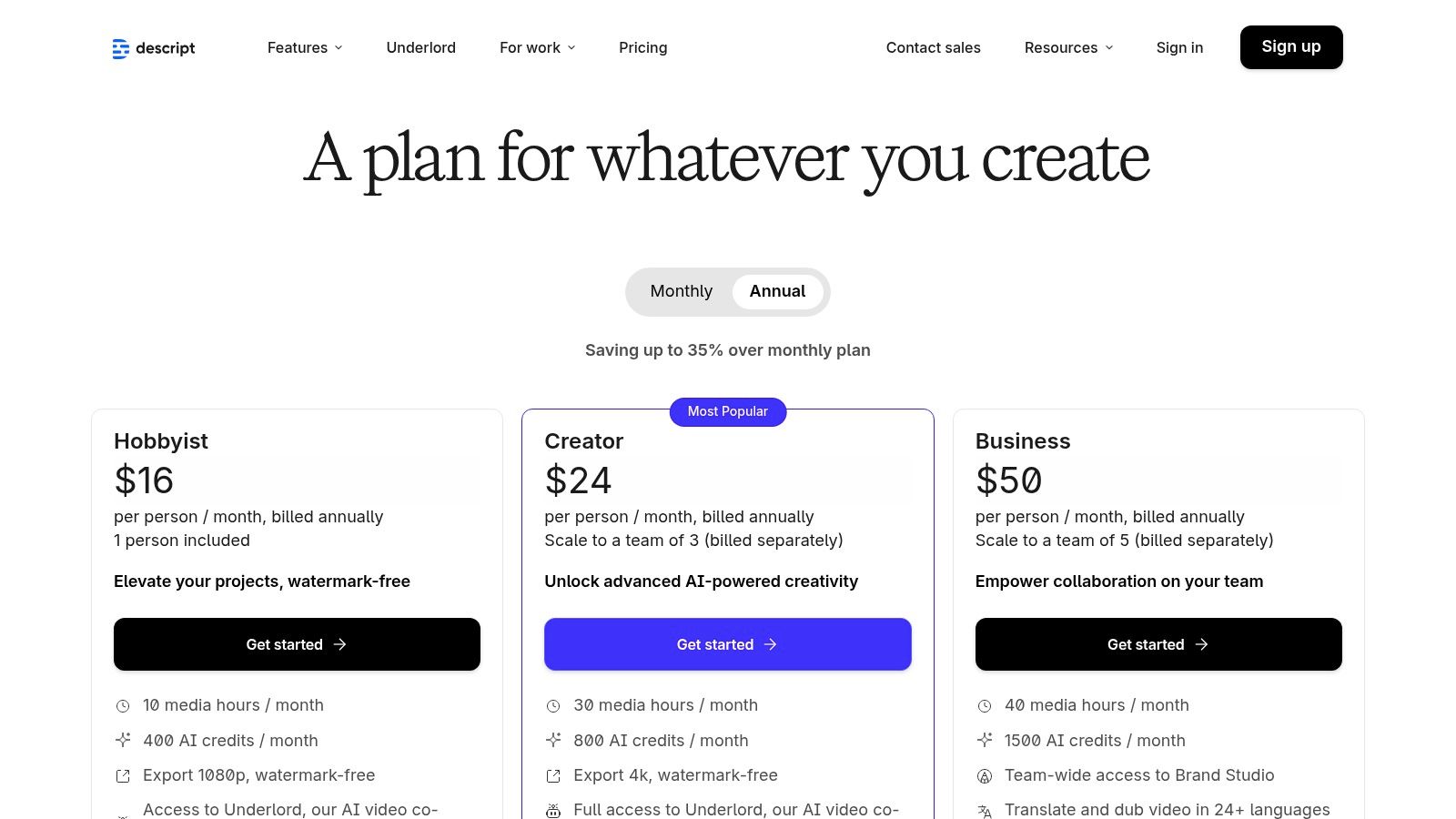
The platform's plans include a set number of Overdub and AI Speech minutes, with pricing structured around the full suite of editing features. While this model is perfect for content production, it is not optimized for high-volume, standalone TTS generation. For projects requiring extensive voice-overs, a key actionable insight is that a service like Verbatik, which offers unlimited text to speech and voice cloning, might be more suitable and cost-effective. Descript’s strength lies in its all-in-one, script-based editing environment. For a deeper dive into one of the innovative platforms, learn more about Descript's unique audio and video editing capabilities that leverage AI speech.
Key Features & Considerations
- Pros: An all-in-one production suite ideal for podcasters and video creators. The voice cloning and TTS are seamlessly integrated into the editing workflow.
- Cons: Not designed as a dedicated, high-volume TTS API. The included AI voice minutes are limited by the subscription tier.
- Best For: Content creators who need a unified platform to write, record, edit, and generate voice-overs for podcasts and videos.
Website: https://www.descript.com/pricing
Top 12 Text-to-Speech Tools Comparison
| Platform | Core Features & Capabilities | Quality & User Experience ★ | Value & Pricing 💰 | Target Audience 👥 | Unique Selling Points ✨ |
|---|---|---|---|---|---|
| 🏆 Verbatik Technologies Limited | 600+ voices, 142 languages, voice cloning, AI avatars, music, sound, video, photo, Chat AI | Studio-quality, expressive, emotion-rich ★★★★☆ | Flexible plans from $15/mo + API $0.000025/char | Creators, businesses, developers | All-in-one multimedia suite + ethical voice cloning 🏆 |
| Amazon Polly (AWS) | 100+ voices, 40+ languages, multiple voice tiers, MP3/OGG/PCM output | Reliable AWS infrastructure ★★★☆☆ | Pay-as-you-go, multiple tiers | Enterprises, scalable apps | AWS integration and long-form generative voices |
| Google Cloud Text-to-Speech | Multiple voice families including WaveNet, Neural2, SSML support | High-fidelity WaveNet voices ★★★★☆ | Free quotas; per-character pricing | Developers, enterprises | Variety of voice models + Google Cloud ecosystem |
| Microsoft Azure AI Speech | Neural HD voices, custom/personal voices, container deployment | Enterprise-grade quality ★★★★☆ | Free monthly chars, complex pricing | Enterprises, regulated industries | Flexible deployment + strong compliance |
| IBM Watson Text to Speech | 35+ neural voices, cloud/on-premise, custom voice, SDKs | Enterprise-focused neural voices ★★★☆☆ | Contact sales; less transparent | Regulated industries, enterprises | On-premise deployment + premium SLAs |
| ElevenLabs | Expressive voice cloning, multilingual, dubbing, mobile apps | Very natural, expressive ★★★★☆ | Credit-based tiers; Free to Enterprise | Creators, enterprises | High-fidelity voice cloning + mobile reader apps |
| PlayHT | Voice cloning, real-time API, multi-tier plans | High-fidelity voice ★★★☆☆ | Annual plans; competitive for heavy users | Creators, agencies | Strong cloning + commercial usage on paid plans |
| WellSaid Labs | Voice avatars, team collaboration, custom voices | Broadcast-grade synthetic voices ★★★★☆ | Higher entry price | Enterprise, brands, L&D | Premium synthetic avatar studio |
| Speechify | Cross-platform apps, celebrity voices, offline mp3 download | User-friendly, mobile-first ★★★☆☆ | Free tier + premium plans | Students, professionals | Ease of use + celebrity voices |
| NaturalReader | Personal/commercial plans, OCR, multi-platform | Good accessibility support ★★★☆☆ | Commercial plans higher priced | Accessibility, personal & commercial | Clear personal vs commercial use |
| ReadSpeaker | 200+ voices, subscription/license/pay-per-use options | Mature accessibility tools ★★★☆☆ | Custom quotes required | Enterprise, education | Strong focus on education & accessibility |
| Descript (Overdub & AI Speech) | Voice cloning + audio/video editing, team workflows | All-in-one production suite ★★★☆☆ | Creator-focused pricing | Podcasters, video teams | Integrated editing + voice cloning in one platform |
The Actionable Takeaway: Choosing a Tool That Scales with Your Creativity
Navigating the landscape of text-to-speech technology reveals a simple truth: the best text to speech tool is not a one-size-fits-all solution. It's the one that seamlessly integrates into your unique workflow, respects your budget, and, most importantly, fuels your creative vision without imposing artificial limits. We've explored a wide spectrum of platforms, from the hyper-scalable developer APIs of giants like AWS, Google, and Microsoft to the artist-focused suites of ElevenLabs and Descript. Each holds its own place in the market.
For large-scale enterprise applications and complex software integrations, the reliability and deep customization offered by cloud providers like Amazon Polly and Microsoft Azure are often non-negotiable. Their infrastructure is built for massive volume and stability. On the other hand, content creators often gravitate toward platforms with intuitive interfaces and emotionally resonant voices, where the focus is less on code and more on crafting a compelling narrative.
However, a crucial takeaway from this analysis is to think beyond a single function. The future of content creation lies in efficiency and versatility. Why juggle multiple subscriptions for voice generation, audio editing, and voice cloning when a unified platform can handle it all? This is where the strategic advantage of a solution like Verbatik becomes apparent. Its model, built on the principle of unlimited text to speech and integrated voice cloning, directly addresses the primary bottlenecks creators face: restrictive character limits and the high cost of custom voice work.
Your Next Steps: From Analysis to Action
To move forward, shift your perspective from "which voice sounds best?" to "which ecosystem empowers me most?". Here is a practical framework for making your final decision:
- Define Your Core Use Case: Are you developing an application, producing audiobooks, creating marketing videos, or designing an e-learning course? Your primary goal dictates the features you should prioritize. For YouTube creators specifically, understanding how to make faceless YouTube videos highlights a key application where high-quality, engaging TTS is essential for success.
- Audit Your Volume Needs: Honestly assess your monthly character or word count requirements. If you're producing content consistently, a "pay-as-you-go" model can become unpredictably expensive. A platform offering unlimited generation provides budget predictability and creative freedom.
- Evaluate the Complete Toolkit: Look beyond the voice library. Consider the value of built-in features like a robust API, realistic voice cloning, and a comprehensive audio editor. An integrated toolkit saves time and streamlines your production process significantly.
- Test and Iterate: Take advantage of free trials. Generate samples for a real project and assess not just the voice quality, but the entire user experience. Is the platform intuitive? Is the output easy to integrate into your existing workflow?
Ultimately, the goal is to select a partner in creation, not just a utility. Choose the tool that removes friction, encourages experimentation, and scales effortlessly as your ambitions grow.
Ready to experience a creative workflow without limits? Verbatik Technologies Limited offers a comprehensive text-to-speech suite with top-tier AI voices, instant voice cloning, and a powerful studio, all under a plan that includes unlimited generation. Visit Verbatik Technologies Limited to see how you can elevate your audio content today.
